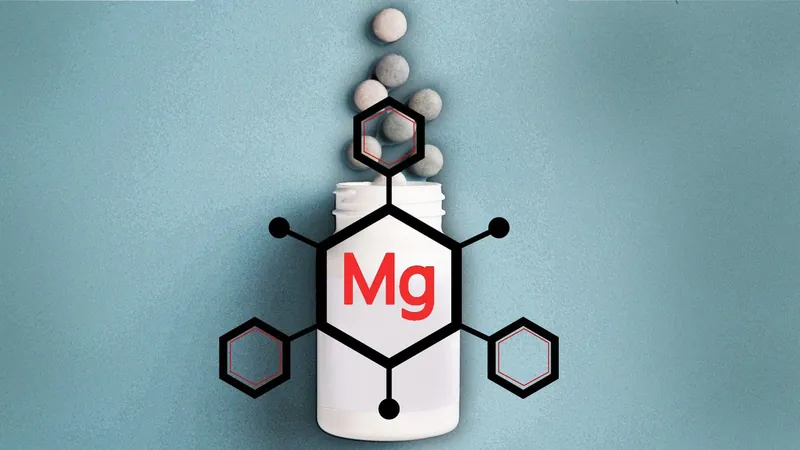
Is Magnesium the Ultimate Wellness Game-Changer?
2025-09-12
Author: Arjun
Magnesium: The Nutrient Everyone's Talking About
Forget what you thought you knew about minerals! Magnesium is taking center stage in the wellness arena, transforming from a forgotten supplement into a must-have health booster. Social media influencers rave about its calming properties, while supplement companies promise it can revolutionize your sleep. But is magnesium truly the health miracle it’s being advertised as, or is it just another fad? Let’s dive in.
What Can Magnesium Do for You?
Magnesium is involved in over 300 biochemical reactions in your body, playing a crucial role in muscle and nerve functions, blood sugar regulation, and maintaining strong bones. This essential mineral is not just an afterthought; it's a linchpin for a healthy cardiovascular system and even your mood!
How Much Magnesium Do You Need?
Most people can naturally get enough magnesium through a healthy diet. Experts recommend that women aim for 320 milligrams and men should get 420 milligrams daily. Just to illustrate, a single banana, a handful of almonds, and a serving of spinach can cover more than half your daily magnesium needs! However, many diets today are laden with processed foods, often leading to a magnesium shortfall.
Testing for Magnesium Levels
Measuring your magnesium levels isn’t as straightforward as you might think. A simple blood test typically shows levels range from 1.7 to 2.2 mg/dL. However, since most magnesium is stored in bones and tissues, these tests might not provide the full picture. Still, they are a good starting point if you're experiencing symptoms of deficiency.
The Dangers of Magnesium Imbalance
Too little magnesium can manifest in fatigue, nausea, and poor appetite, while severe deficiency might lead to muscle cramps and irregular heart rhythms. Conditions like Crohn's disease, kidney issues, and malnutrition can exacerbate this problem.
On the other end of the spectrum, excess magnesium—also known as hypermagnesemia—is rare but serious, usually resulting from kidney failure or excessive supplementation. Symptoms can include nausea and, in severe cases, difficulty breathing.
Get Your Magnesium Through Food!
Want to boost your magnesium levels? Look no further than your plate! Harvard experts advise consuming magnesium-rich foods that offer additional benefits like fiber and protein—something supplements can't match. Leafy greens like spinach and kale, along with nuts and seeds like almonds and pumpkin seeds, are delicious and nutritious options. Even your nightly square of dark chocolate counts!
Following a Mediterranean-style diet? You're in luck! This eating approach is a goldmine for magnesium, all while promoting heart and brain health.
Should You Rely on Supplements?
For most, the answer is no. A balanced diet typically provides all the magnesium you need. However, certain individuals—like those with diagnosed deficiencies or gastrointestinal disorders—may benefit from supplements. If you decide to go this route, choose wisely based on your health goals. For instance, magnesium citrate is great for constipation, while magnesium glycinate may aid sleep and anxiety.
Beware, though: supplements are not without risks. High doses can cause diarrhea or interfere with medications. Stick to under 350 mg daily for safety, and always consult with your healthcare professional if you have chronic conditions or are considering jumping on the magnesium hype train.


 Brasil (PT)
Brasil (PT)
 Canada (EN)
Canada (EN)
 Chile (ES)
Chile (ES)
 Česko (CS)
Česko (CS)
 대한민국 (KO)
대한민국 (KO)
 España (ES)
España (ES)
 France (FR)
France (FR)
 Hong Kong (EN)
Hong Kong (EN)
 Italia (IT)
Italia (IT)
 日本 (JA)
日本 (JA)
 Magyarország (HU)
Magyarország (HU)
 Norge (NO)
Norge (NO)
 Polska (PL)
Polska (PL)
 Schweiz (DE)
Schweiz (DE)
 Singapore (EN)
Singapore (EN)
 Sverige (SV)
Sverige (SV)
 Suomi (FI)
Suomi (FI)
 Türkiye (TR)
Türkiye (TR)
 الإمارات العربية المتحدة (AR)
الإمارات العربية المتحدة (AR)